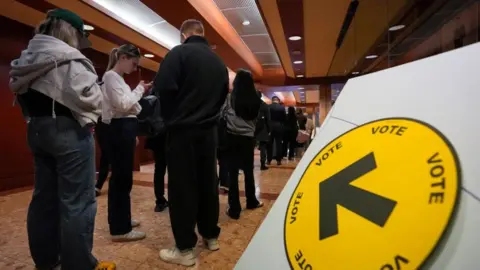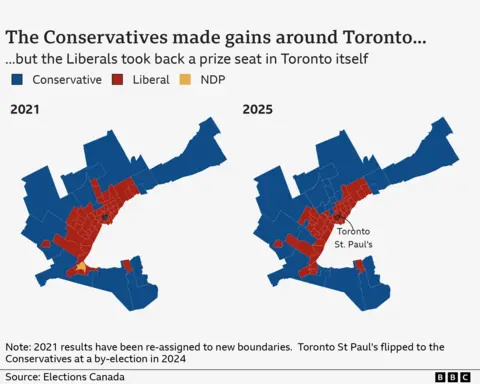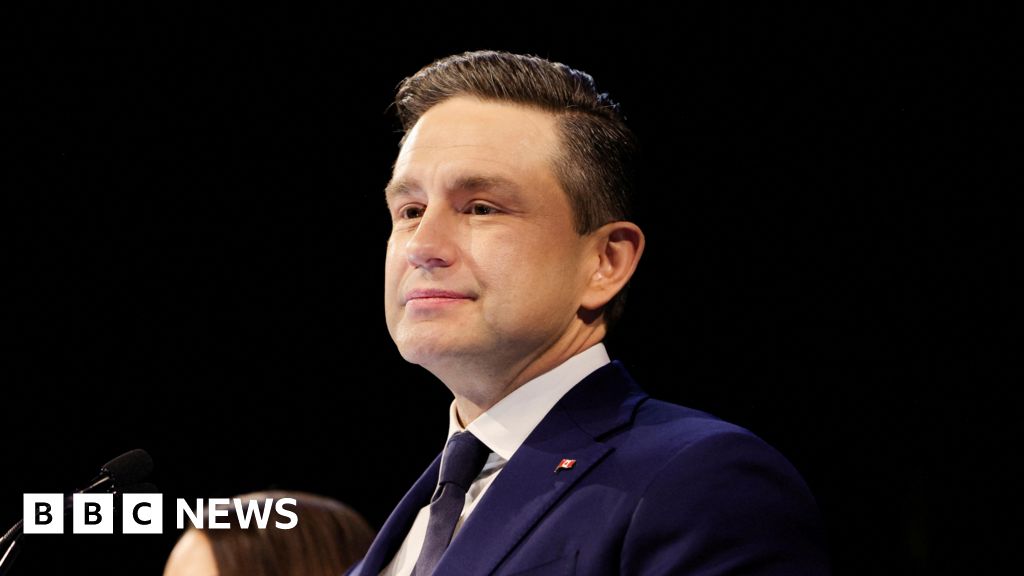Data journalism team
 Reuters
ReutersWhile the government of Canada may not have changed hands, the federal election results are anything but business as usual.
Party leaders lost their own seats, the New Democratic Party (NDP) now faces the possibility of life on the sidelines and the Liberal Party pulled off a dramatic turnaround in fortunes, all while led by a prime minister who wasn’t even a member of Parliament (MP).
Preliminary results from Elections Canada show that 17% of seats – 59 out of 343 – changed hands in this election, up from just 7% – 22 out of 338 – in 2021.
The rise in the number of available seats in the House of Commons, from 338 to 343, reflects a new political map which accounts for changes in population.
Leaders from three of the five parties represented in the House of Commons failed to win their seats.
Conservative leader Pierre Poilievre – who was on course to become prime minister three months ago when his party held a double-digit lead in the polls – lost his seat in Carleton, Ontario to the Liberals.
Jagmeet Singh resigned as NDP leader after finishing third in his British Columbia seat of Burnaby Central, while the Green Party’s co-leader Jonathan Pedneault came fifth in Outremont, Quebec.
Only Yves-François Blanchet of the Bloc Québécois and Elizabeth May, the other Green co-leader, retained their seats while Mark Carney became an MP for the first time.
All 59 seats that flipped went to either the Liberals or Conservatives.
The NDP lost 17 of the 24 seats they were defending – 10 to the Conservatives and seven to the Liberals – and fell short of the 12 seats required for official party status.
This means the loss of parliamentary funding for things like office budgets and technology equipment, as well as fewer chances to ask questions of the government and sit on committees.
NDP losses were part of a wider shift away from Canada’s smaller parties.
The Bloc Québécois had 35 seats going into Monday’s vote, taking into consideration the impact of boundary changes on 2021 results – calculated by Elections Canada – and last year’s victory in the LaSalle-Émard-Verdun by-election.
It lost 13 of them in Quebec, with all but one going to the Liberals.
Terrebonne, a suburb of Montreal, flipped from the Bloc to the Liberals by just a few dozen votes.
Meanwhile, the Greens lost their Kitchener Centre riding, the first Ontario seat in their history, to the Liberals.

Despite making overall gains it was still a turbulent night for incumbents in the two largest parties.
The Liberals gave up 16 seats – all to the Conservatives – which was twice as many as the eight they lost in 2021.
Nine of the 16 losses came in Toronto and the surrounding “905” – places that all share the same area code.
The Conservatives saw 12 of their MPs suffer defeat including Poilievre, up from nine four years ago.
All 12 were won by Liberals, including Toronto St Paul’s which the Conservatives previously flipped in a 2024 by-election.


Read full article at source
Stay informed about this story by subscribing to our regular Newsletter




